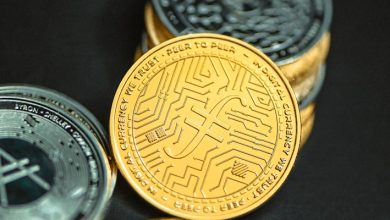The Role of Tokens in Decentralized Finance (DeFi)

- Understanding the significance of tokens in DeFi
- How tokens are utilized in decentralized finance platforms
- The impact of tokens on the DeFi ecosystem
- Exploring the various types of tokens in DeFi
- Tokenomics: A critical aspect of decentralized finance
- Challenges and opportunities in token-based DeFi projects
Understanding the significance of tokens in DeFi
Tokens play a crucial role in the realm of Decentralized Finance (DeFi). They serve as digital assets that represent ownership or provide access to specific functionalities within a decentralized ecosystem. Understanding the significance of tokens in DeFi is essential for anyone looking to participate in this innovative financial landscape.
One of the key aspects of tokens in DeFi is their utility value. These tokens often have various use cases within decentralized applications (dApps) or protocols. For example, a token may be used for governance purposes, allowing holders to vote on proposals or changes within the ecosystem. Additionally, tokens can be staked to earn rewards or provide liquidity to decentralized exchanges.
Another important function of tokens in DeFi is their role in facilitating decentralized transactions. By using tokens as a medium of exchange, users can transfer value without the need for traditional intermediaries like banks. This not only reduces transaction costs but also increases the speed and efficiency of financial transactions within the decentralized ecosystem.
Furthermore, tokens can also act as a store of value within DeFi. Users can hold tokens as a form of investment, speculating on their potential value appreciation over time. This can provide opportunities for users to diversify their investment portfolios and potentially earn significant returns in the volatile cryptocurrency market.
In conclusion, tokens are integral to the functioning of DeFi, providing utility, facilitating transactions, and acting as a store of value within decentralized ecosystems. By understanding the significance of tokens in DeFi, individuals can make informed decisions when participating in this exciting and rapidly evolving sector of the cryptocurrency market.
How tokens are utilized in decentralized finance platforms
Decentralized finance platforms utilize tokens in various ways to facilitate transactions and govern their ecosystem. These tokens serve as the native currency within the platform and can be used for staking, voting, liquidity provision, and governance.
Staking tokens allow users to participate in securing the network by holding a certain amount of tokens in a wallet. In return, they receive rewards in the form of additional tokens or fees generated by the platform. This incentivizes users to contribute to the security and stability of the network.
Voting tokens give users the right to participate in governance decisions, such as protocol upgrades, changes to parameters, and the addition of new features. By holding a certain amount of voting tokens, users can influence the direction of the platform and ensure that their voices are heard.
Liquidity provision tokens are used in decentralized exchanges to provide liquidity for trading pairs. Users can deposit their tokens into liquidity pools and earn a share of the trading fees generated by the platform. This helps to ensure that there is enough liquidity for users to trade assets seamlessly.
Governance tokens are used to govern the platform by allowing holders to vote on proposals and changes to the protocol. This decentralized decision-making process ensures that the platform remains transparent, secure, and responsive to the needs of its users.
The impact of tokens on the DeFi ecosystem
Tokens play a crucial role in the decentralized finance (DeFi) ecosystem by providing a means of access, ownership, and participation. The impact of tokens on DeFi is evident in various aspects of the ecosystem, from governance and decision-making to liquidity provision and incentivization.
Tokens serve as the lifeblood of DeFi platforms, allowing users to stake their assets, earn rewards, and participate in governance processes. Through the use of tokens, users can vote on protocol upgrades, propose changes to the network, or even delegate their voting power to other community members.
Moreover, tokens also play a significant role in liquidity provision on decentralized exchanges (DEXs) and automated market makers (AMMs). By providing liquidity in the form of token pairs, users can earn fees and rewards, helping to bootstrap the liquidity of a platform and ensure its smooth operation.
In addition, tokens are often used to incentivize users to participate in various activities within the DeFi ecosystem, such as providing liquidity, borrowing assets, or simply holding tokens for a certain period. These incentives help to drive user adoption, increase platform usage, and create a vibrant and active community around a particular DeFi project.
Overall, the impact of tokens on the DeFi ecosystem cannot be understated. They are a fundamental building block of decentralized finance, enabling users to interact with protocols, earn rewards, and contribute to the growth and development of the ecosystem as a whole. By understanding the role that tokens play in DeFi, users can better navigate the decentralized financial landscape and take advantage of the opportunities that it presents.
Exploring the various types of tokens in DeFi
When it comes to decentralized finance (DeFi), tokens play a crucial role in the ecosystem. There are various types of tokens that serve different purposes within the DeFi space. Understanding these different token types is essential for anyone looking to navigate the world of DeFi successfully.
One common type of token in DeFi is utility tokens. These tokens are used to access or pay for services within a specific DeFi platform. They often grant holders certain privileges or benefits, such as discounted fees or voting rights. Utility tokens are essential for interacting with decentralized applications (dApps) and smart contracts.
Another type of token is governance tokens. These tokens give holders the power to vote on decisions related to the development and management of a DeFi protocol. Governance tokens are crucial for decentralized autonomous organizations (DAOs) and allow community members to have a say in the direction of the project.
Stablecoins are a type of token that is pegged to a stable asset, such as the US dollar. These tokens provide stability in a volatile market and are often used as a medium of exchange or store of value within DeFi platforms. Stablecoins are essential for minimizing the risk associated with price fluctuations.
Security tokens represent ownership of real-world assets, such as equity or debt. These tokens are subject to regulatory requirements and are designed to provide investors with legal rights and protections. Security tokens offer a bridge between traditional finance and the world of DeFi.
Finally, yield farming tokens are a type of token that users can earn by providing liquidity to DeFi protocols. These tokens incentivize liquidity providers to participate in decentralized exchanges and lending platforms. Yield farming tokens can be a lucrative way to earn passive income in the DeFi space.
Tokenomics: A critical aspect of decentralized finance
Tokenomics is a crucial aspect of decentralized finance (DeFi) that plays a significant role in shaping the ecosystem. It refers to the design and distribution of tokens within a DeFi project, which impacts various factors such as token value, supply, demand, and overall market dynamics. Understanding tokenomics is essential for investors and users to make informed decisions and navigate the DeFi space effectively.
Tokenomics encompasses several key elements that influence the performance and sustainability of a DeFi project. These include token distribution, token utility, token supply, token issuance schedule, and governance mechanisms. Each of these factors contributes to the overall ecosystem and determines the success of the project in the long run. By analyzing tokenomics, stakeholders can assess the viability and potential of a DeFi project before getting involved.
One critical aspect of tokenomics is the role of tokens in incentivizing participation and driving network effects within the DeFi ecosystem. Tokens are often used to reward users for providing liquidity, staking their assets, or participating in governance activities. By aligning incentives through token rewards, DeFi projects can attract more users and liquidity, ultimately enhancing the overall ecosystem and value proposition.
Challenges and opportunities in token-based DeFi projects
Token-based DeFi projects present a range of challenges and opportunities for investors and developers alike. One of the main challenges is the volatility of token prices, which can fluctuate wildly in a short period of time. This can result in significant gains or losses for investors, depending on the market conditions.
On the other hand, token-based DeFi projects also offer unique opportunities for innovation and growth in the decentralized finance space. By leveraging blockchain technology and smart contracts, developers can create new and exciting ways to interact with financial products and services.
Another challenge in token-based DeFi projects is the risk of security vulnerabilities and hacks. Due to the decentralized nature of these projects, there is often a lack of oversight and regulation, making them susceptible to malicious attacks. Developers need to constantly update and improve their security measures to protect investors’ funds.
Despite these challenges, token-based DeFi projects have the potential to revolutionize the traditional finance industry by providing greater accessibility and transparency to users. By eliminating intermediaries and reducing costs, decentralized finance can empower individuals to take control of their financial assets and investments.



